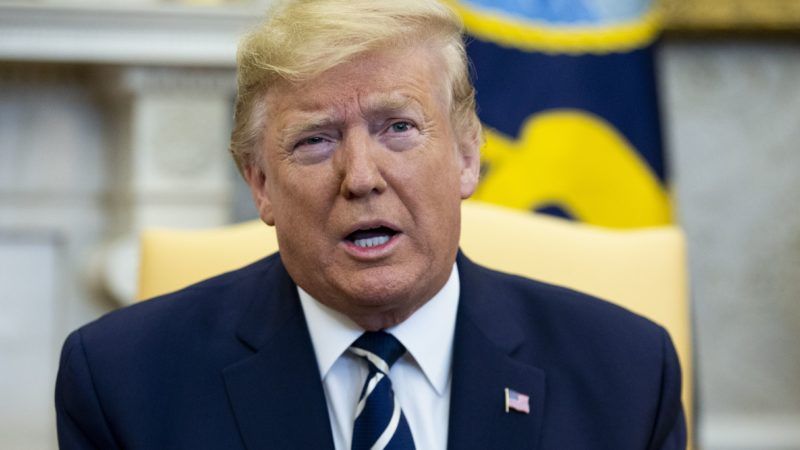Republican Deficit Hypocrisy Will Make America's Debt Problems Much Harder To Solve
A new report shows federal budget deficits pushing past $1 trillion for the next decade.

It is obvious at this point that Republicans, on the whole, do not care about debt or deficits—at least not in any substantive sense. That's not just an economic problem. It's a political problem that is increasing the risk of a debt crisis in the future.
Although the GOP spent the better part of Barack Obama's presidency complaining bitterly about the trillion-dollar budget gaps the country ran during his first term, and President Trump promised on the campaign trail to eliminate all federal debt, deficits have increased even faster than expected under his watch, and total federal debt has risen accordingly. And that, in turn, is likely to have long-term consequences for both the economy and for the broader politics of debt and deficits.
You can see the nation's trajectory spelled out in painstaking detail in the Congressional Budget Office's annual budget outlook, released yesterday.
Not only does it show that the trillion-dollar deficits that followed the financial crisis have returned, it projects that deficits of that size are expected to be a fixture throughout the coming decade. Indeed, the next decade's deficits are now expected to be $160 billion higher, all together, than was projected as recently as last August. We are entering an era of permanent trillion-dollar deficits.
By 2030, CBO projects the deficit—the annual gap between spending and revenues—will reach $1.7 trillion, which is roughly the size of the entire federal budget in 1999. Rising debt and deficits, the budget office predicts, will coincide with slowing economic growth, dropping from 2.2 percent this year to 1.5 percent a decade from now.
The federal government will be borrowing more, and the economy will be expanding at a slower pace. It may not be an immediate economic crisis, but we are spending and borrowing ourselves into stagnancy and decline.
The GOP's what-me-worry acquiescence to this eventuality has been driven mostly by political considerations: In the absence of a crisis, lawmakers, regardless of party, have little incentive to close the budget gap, because doing so requires some combination of raising taxes and cutting spending, neither of which are particularly popular. The biggest drivers of long-term debt are old-age entitlements, Medicare and Social Security, that benefit seniors, many of whom are reliable Republican voters. Trump ran against cutting those entitlements, and although his rhetoric has wavered slightly in recent weeks, he has not pressed the issue, and Republicans in Congress don't exactly seem eager to tackle it either.
Nor does Trump appear to worry much about what happens down the road. When Trump advisers warned in 2018 about the possibility of a future deficit crisis, Trump reportedly shrugged it off, saying, "Yeah, but I won't be here." Absent some forcing event, there is little reason to expect any significant departure from the party's current trajectory of do-nothingism.
One possible forcing event would be the election of a Democratic president, which would almost certainly see the GOP return to its Obama-era complaints about sky-high debt and deficits. Yet if that were to happen, it's easy to imagine that Democrats would simply dismiss these complaints as hypocritical, viewing them not as efforts to enforce needed fiscal restraint but as attempts to check the opposite party's agenda. Republicans, in other words, aren't just piling on debt now, while they are in power. They aren't just exacerbating the likelihood of long-term economic stagnation. By demonstrating how little they care about fiscal restraint, they are creating a political environment that makes it even more likely that Democrats will proceed with a deficit denialist agenda of their own.
You can already see evidence of this in the Democratic primary race, where candidates with pricey domestic policy agendas have consistently sat atop the polls. And you can see it in the liberal intelligentsia's embrace of simplistic deficits-don't-matter economic theories, and complaints about how the CBO's emphasis on basic budget math hampers the progressive agenda. The GOP's rank deficit hypocrisy is fueling the factions of liberalism that view concerns about fiscal soundness as barriers to political and policy success.
In the end, that faction may not gain power. And if it does, Republicans might find other avenues to block their agenda. Even still, with every passing day that the Trump-era GOP proves that Obama-era Republicans only cared about high debt and deficits as a means of criticizing a Democratic president, rather than as a substantive policy goal, the likelihood increases that Democrats will take the GOP's current behavior as license to pursue an even more expansive and expensive agenda of their own. Republicans under Trump haven't just carelessly let deficits rise and debt pile up, they have made it even harder to find a politically possible way of righting the nation's fiscal trajectory.



Show Comments (80)